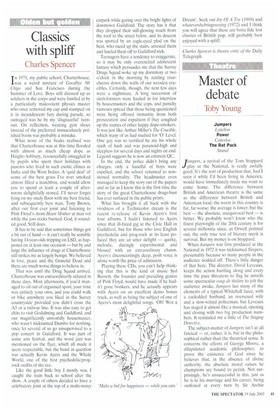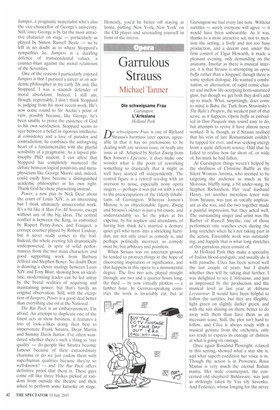Master of debate
Toby Young
Jumpers Lyttelton Power Cottesloe The Rat Pack Smend
roamers, a revival of the Tom Stoppard J play at the National, is really awfully good. It's the sort of production that, had seen it while I'd been living in America, would have immediately made me want to come home. The difference between British and American theatre is the same as the difference between British and American food: the worst in this country is far, far worse; the average is lower; but the best — the absolute, unequivocal best — is better. We probably won't know who the finest playwright of the 20th century is for several millennia since, as Orwell pointed Out, the only true test of literary merit is survival. But my money is on Stoppard.
When Jumpers was first produced at the National in 1972 it was nicknamed Sleepers, presumably because so many people in the audience nodded off. There's little danger of that here. The director, David Leveaux, keeps the action hurtling along and every time the pace threatens to flag he unveils some spectacular coup de theatre to jolt the audience awake. Jumpers has many of the elements of a typical Whitehall farce, with a cuckolded husband, an oversexed wife and a slow-witted policeman, but Leveaux has staged it almost like a musical, opening and closing with two big production numbers. It reminded me a little of The Singing Detective.
The subject-matter of Jumpers isn't at all farcical — or, rather, it is, but in the philosophical rather than the theatrical sense. It concerns the efforts of George Moore, a dilapidated academic philosopher, to prove the existence of God since he believes that, in the absence of divine authority, the absolute moral values he champions are bound to perish. Not surprisingly, he's unsuccessful in this, just as he is in his marriage and his career, being outfoxed at every turn by Sir Archie
Jumper, a pragmatic materialist who's also the vice-chancellor of George's university. Still, since George is by far the most attractive character on stage — particularly as played by Simon Russell Beale — we're left in no doubt as to where Stoppard's sympathies lie. Jumpers is a dazzling defence of transcendental values, a counter-blast against the moral relativism of the Seventies.
One of the reasons I particularly enjoyed Jumpers is that I pursued a career as an academic philosopher in my early 20s and, like Stoppard, I was a staunch defender of moral absolutism. Indeed. I still am, though, regrettably, I don't think Stoppard is, judging from his most recent work. He's now come round to Sir Archie's point of view, possibly because, like George, he's been unable to prove the existence of God to his own satisfaction. Stoppard seems to veer between a belief in rigorous intellectual consistency and a love of paradox and contradiction; he combines the unforgiving heart of a fundamentalist with the playful sensibility of a pragmatist. As a lapsed philosophy PhD student, I can attest that Stoppard has completely mastered the debate between logical positivists and metaphysicians like George Moore and, indeed, could easily have become a distinguished academic philosopher in his own right. Thank God he chose playwriting instead.
Power, a new play by Nick Dear about the court of Louis XIV, is an interesting but I think ultimately unsuccessful work. It's a bit like A Man For All Seasons, except without any of the big ideas. The central conflict is between the King, as embodied by Rupert Penry-Jones, and Fouquet, a corrupt courtier played by Robert Lindsay, but it never really comes to the boil. Indeed, the whole evening felt dramatically underpowered, in spite of solid performances from the two main characters and good supporting work from Barbara Jefford and Stephen Boxer. No doubt Dear is drawing a clever analogy between Louis XIV and Tony Blair, showing how an idealistic, modernising leader can be led astray by the brutal realities of acquiring and maintaining power, but that's hardly an original observation. Still, with the exception of Jumpers, Power is a good deal better than everything else on at the National.
The Rat Pack is an embarrassment, I'm afraid. An attempt to duplicate one of the finest acts in show business, it features a trio of look-a-likes doing their best to impersonate Frank Sinatra, Dean Martin and Sammy Davis Junior. I've often wondered whether there's such a thing as 'star quality' — do people like Sinatra become famous because of their extraordinary charisma or do we just endow them with superhuman qualities because they're so well-known? — and The Rat Pack offers definitive proof that there is. These guys come off like three blokes picked at random from outside the theatre and then asked to perform some karaoke on stage. Honestly, you'd be better off staying at home, putting 'New York, New York' on the CD player and serenading yourself in front of the mirror.



























































 Previous page
Previous page